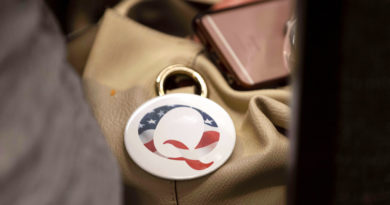Analysis | QAnon, the Conspiracy Theory Creeping Into U.S. Politics
By Laurence Arnold | Bloomberg,
Supporters of a U.S. conspiracy theory known as QAnon have been a feature on the fringes of American politics since late 2017. The internet-fueled movement has crept closer to the mainstream more recently, with some believers advancing in campaigns for congressional seats and President Donald Trump, given the opportunity to throw cold water on the movement’s rhetoric, choosing instead to say he appreciates how its adherents seem to like him.
1. What is QAnon?
It’s a concoction of allegations against Democratic politicians, celebrities and supposed members of a “deep state” government bureaucracy, against whom Trump is seen as waging a valiant battle. Purported pedophilia rings are central to the conspiracy theory, along with Satanism and secret judicial proceedings. QAnon believers await the “Great Awakening,” or the moment the general public realizes the conspiracy exists, and the “Storm,” when thousands of wrongdoers face justice. (During a photo op with military generals in 2017, Trump commented, “You guys know what this represents? Maybe it’s the calm before the storm.” That moment is thought to have inspired part of QAnon’s beliefs.) The Federal Bureau of Investigation’s Phoenix field office said last year that conspiracy theories like QAnon can potentially incite acts of domestic terrorism.
2. Where did this come from?
QAnon shares roots with the so-called PizzaGate conspiracy theory that took hold during the 2016 presidential campaign; it held that top Democrats including Hillary Clinton, Trump’s presidential opponent, were involved in a child sex-trafficking ring operating out of a Washington pizza restaurant. (One follower drove from North Carolina to Washington to “self-investigate” the theory and fired an assault rifle into a closet at the restaurant.) In October 2017, almost one year after Trump’s surprise win, someone using the name Q hinted on the pseudo-anonymous discussion board 4chan — a platform known for perpetuating white nationalism — that Clinton’s arrest was imminent. After that claim proved unfounded, Q continued to post cryptic content termed “drops,” which get deciphered into plain English.
3. Who is Q?
One common belief among QAnon subscribers is that Q is a Trump-supporting, high-ranking military official. QAnon also holds open the possibility that control of Q’s messages might have changed hands over the years, and could now involve a network of individuals with security clearances. NBC News reported in 2018 that “a small-time YouTube video creator and two moderators of the 4chan website” banded together to turn initial Q posts into “an entire mythology.”
4. How is QAnon bleeding into mainstream politics?
At least 11 candidates seeking seats in the U.S. House of Representatives in the November election had expressed belief in or support for QAnon, according to July tallies by Axios and the Washington Post. Like Trump, all of them are Republicans. More recently, Media Matters for America, a nonprofit group that says its mission is “correcting conservative misinformation,” counted 20 candidates — 19 Republicans and one independent — who “have endorsed or given credence to the conspiracy theory or promoted QAnon content” and have secured a spot on their state’s congressional ballot. Of those, two appear to have strong chances of defeating their Democratic competitors and joining Congress: Lauren Boebert, a Colorado bar owner and avid gun-rights activist who has said that she hopes Q is real “because it only means America is getting stronger and better,” and Marjorie Taylor Greene, the owner of a Georgia construction company, who, in a 2017 video, called Q “a patriot” who is “on the same page as us” and “is very pro-Trump.” A Republican nominee for the Senate, Jo Rae Perkins in Oregon, said in a since-deleted video that “I stand with Q.” She has an uphill battle to unseat the incumbent Democrat, Senator Jeff Merkley.
5. Do many people really believe in QAnon?
It’s hard to know, given that so much of the discussion circulates online and anonymously. In a Pew Research Center survey released in March, 76% of U.S. adults said they hadn’t heard or read anything about QAnon. Nevertheless, QAnon pops up occasionally in mainstream consciousness. Actress Roseanne Barr and former Major League Baseball pitcher Curt Schilling have helped promote elements of the theory. The letter Q can be seen on shirts, posters and hats at Trump rallies. In 2018, Vice President Mike Pence posed for photos with members of a county sheriff’s office in Florida who had provided security for him during a visit. One sergeant, on his tactical vest, sported a red and black patch bearing the letter Q and the phrase “Question the Narrative.” The photo was widely shared on Twitter, and the officer was demoted.
6. What is Trump’s involvement?
He has retweeted QAnon content on multiple occasions and has a predilection for conspiracy theories, having advanced unfounded theories about former President Barack Obama’s birthplace, foul play in the death of Supreme Court Justice Antonin Scalia and widespread voter fraud in the 2016 popular election. Trump’s repeated talk about a “deep state” of unelected government workers undermining his presidency, and about what he calls hoaxes and witch hunts, parallel the logic and language of QAnon.
7. Has Trump specifically addressed QAnon?
Yes. Asked about the conspiracy theory at a news conference on Aug. 19, Trump said, “I don’t know much about the movement other than I understand they like me very much, which I appreciate.” Pressed specifically on whether he is secretly battling a satanic cult of pedophiles, he said, “I haven’t heard that, but is that supposed to be a bad thing or a good thing? I mean, you know — if I can help save the world from problems, I’m willing to do it. I’m willing to put myself out there.”
8. What explains this phenomenon?
QAnon’s apocalyptic narrative is appealing to some at a time when the goal of some American politicians and their followers is destruction, not mere defeat, of the opponent. Nancy L. Rosenblum and Russell Muirhead, authors of a 2019 book on “the new conspiracism,” say a key driver of “today’s storm of allegations” is Trump’s role “in formulating and promoting them.”
For more articles like this, please visit us at bloomberg.com
©2020 Bloomberg L.P.
*** This article has been archived for your research. The original version from The Washington Post can be found
This article has been archived for your research. The original version from The Washington Post can be found here.
***


